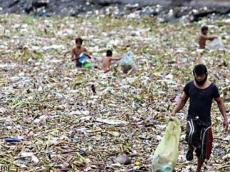|
|
TODAY.AZ / Weird / Interesting
World faces global garbage crisis
08 November 2012 [19:30] - TODAY.AZ
 With approximately 1.3 billion tonnes of municipal waste generated each year, and volumes expected to increase to 2.2 billion tonnes by 2025 according to World Bank figures, urgent action is needed to head off the threat to the environment and human health posed by this global waste crisis.
With approximately 1.3 billion tonnes of municipal waste generated each year, and volumes expected to increase to 2.2 billion tonnes by 2025 according to World Bank figures, urgent action is needed to head off the threat to the environment and human health posed by this global waste crisis.This growing problem was foremost in the minds of delegates who gathered at the biennium conference of the UNEP-hosted Global Partnership on Waste Management (GPWM), held on November 5 and 6 in Osaka, Japan. The conference brought together waste experts from around the world to find answers to the global challenge of waste management and reap the economic and environmental benefits through better coordination.
The threat posed by poor waste management is particularly prominent in low-income countries where waste-collection rates are often below 50 per cent. Piles of garbage along river banks; thick smoke from open burning of mixed, and partly toxic, waste; pungent odours; flies and rodents are an all too familiar scene.
Ever-faster population growth, urbanization and economic development are producing increasing quantities of waste that are overburdening existing waste-management systems. Besides having serious economic, environmental and health implications, unsound waste management has a social dimension. Like most environmental hazards, deficiencies in waste management disproportionately affect poorer communities as waste is often dumped on land adjacent to slums. Left with the choice between going hungry and waste picking, one per cent of the urban population in developing countries choose to sift through the detritus on dumps and dirty streets.
Millions of these waste pickers are being exposed to hazardous substances as they try to secure their and their families' survival. Lead, mercury and infectious agents from healthcare facilities - as well as dioxins and other harmful emissions released during the recovery of valuable materials from e-waste - not only affect the health of waste pickers, but further contribute to air, land and water contamination. As the crisis unfolds, there are significant opportunities for organizing the waste sector, with all its complexities, in a way that is more economically, environmentally and socially sustainable.
Matthew Gubb, Director of the United Nations Environment Programme's International Environmental Technology Centre (IETC), recognizes both risks and opportunities inherent in the waste sector and highlights it as "a model area for greening the economy".
Indeed, if handled properly, waste management has huge potential to turn problems into solutions and to "lead the way towards sustainable development" through the recovery and reuse of valuable resources; the creation of new business and employment opportunities, including for the informal sector; reduced emissions of greenhouse gases from waste management operations, such as landfills; and conversion of waste to energy. The GPWM, an initiative hosted at UNEP's International Environmental Technology Centre (IETC), is already set up to answer this call, enhancing cooperation among various international stakeholders to promote better waste management practices and resource conservation and efficiency.
URL: http://www.today.az/news/interesting/114907.html
 Print version
Print version
Views: 2123
Connect with us. Get latest news and updates.
See Also
- 19 February 2025 [22:20]
Visa and Mastercard can return to Russia, but with restrictions - 05 February 2025 [19:41]
Japan plans to negotiate with Trump to increase LNG imports from United States - 23 January 2025 [23:20]
Dubai once again named cleanest city in the world - 06 December 2024 [22:20]
Are scented candles harmful to health? - 23 November 2024 [14:11]
Magnitude 4.5 earthquake hits Azerbaijan's Lachin - 20 November 2024 [23:30]
Launch vehicle with prototype of Starship made its sixth test flight - 27 October 2024 [09:00]
Fuel prices expected to rise in Sweden - 24 October 2024 [19:14]
Turkiye strikes terror targets in Iraq and Syria - 23 October 2024 [23:46]
Kazakhstan supplied almost entire volume of oil planned for 2024 to Germany in 9 months - 23 October 2024 [22:17]
Taiwan reported passage of Chinese Navy aircraft carrier near island
Most Popular
 Macron kicked out of Niger
Macron kicked out of Niger
 Apple wants to develop new processors using AI
Apple wants to develop new processors using AI
 EBRD highlights Azerbaijan’s strong potential in developing low-carbon hydrogen sector
EBRD highlights Azerbaijan’s strong potential in developing low-carbon hydrogen sector
 Trump blocks Samsung and SK from exporting U.S. chip equipment to China
Trump blocks Samsung and SK from exporting U.S. chip equipment to China
 American officials praise Azerbaijan’s support at border checkpoint
American officials praise Azerbaijan’s support at border checkpoint
 Anne Boyon in Shusha. Why were you showing off?
Anne Boyon in Shusha. Why were you showing off?
 Trial testimony confirms illegal settlement of foreigners in formerly occupied Azerbaijani territories
Trial testimony confirms illegal settlement of foreigners in formerly occupied Azerbaijani territories
